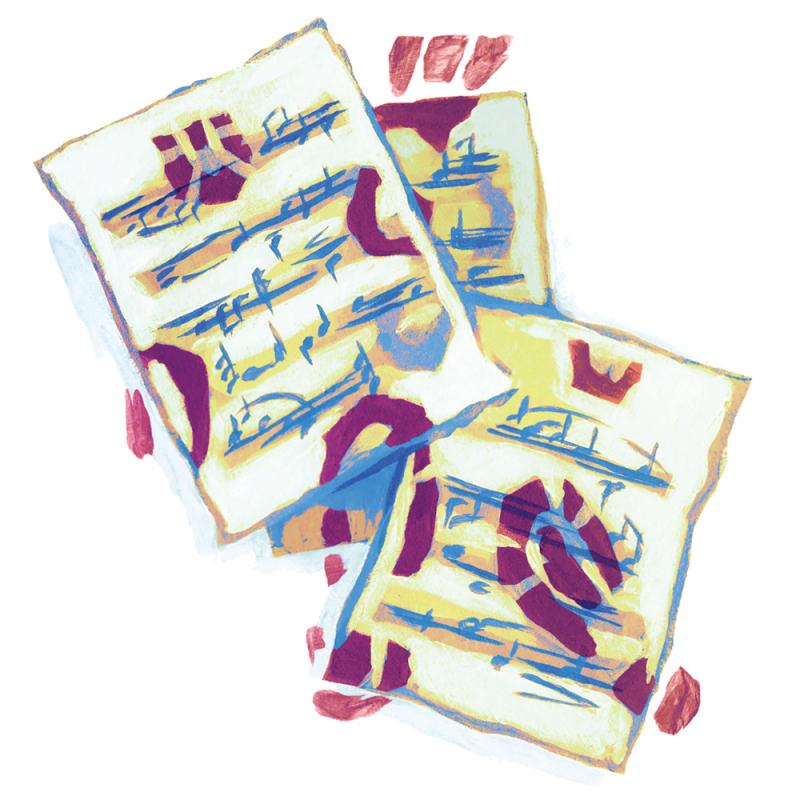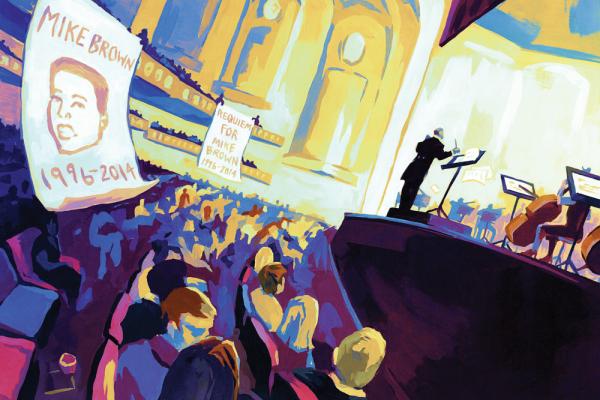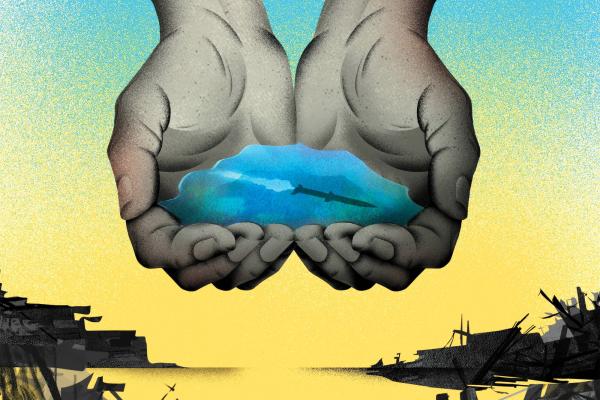IN FALL 2014, the St. Louis Symphony Orchestra performed Brahms’ Requiem on a Saturday evening two months after the murder of Michael Brown Jr., at a concert hall about 10 miles from Canfield Green, where Brown was killed and his adolescent body left out in the Missouri August sun for four and a half hours.
That summer and fall, people in the city and county of St. Louis lived in the tension of waiting — we were waiting for a grand jury to make a decision. Not a verdict about the officer’s guilt: The grand jury was tasked with deciding whether this murder was even a murder at all — whether anything happened on Aug. 9 that could even be considered maybe a crime. Maybe worth investigating. Or whether it was just a regular day’s work.
As intermission was ending and folks were back in their seats, just as the orchestra was regathered and the conductor was raising his baton, a small group of ticketholders in the audience stood up and sang. In singing, they asked the audience, made up largely of people who could choose whether or not they were impacted by the grand jury’s decision that loomed over the city like the shadow of death, to make a decision of their own. They stood up, one by one, and joined their voices in an old labor song: “Which side are you on, friend, which side are you on?” they sang. “Justice for Mike Brown is justice for us all. Which side are you on, friend, which side are you on?” They hung banners made of bedsheets over the balcony; one that echoed the piece being performed that evening was painted: “Requiem for Mike Brown, 1996-2014.”
These protesters brought this question — this disruption — into a space that could’ve kept it to business as usual. They sang the two refrains in repetition, almost like a Taizé chant, for several minutes, then they left the hall together, chanting a chant that at the time was still brand-new to most Americans: Black Lives Matter.
The disrupters left to a mix of silence and applause from the audience and the musicians. The concert continued, but the question hung in the air. It’s the same question that hangs in the air of many of Jesus’ disciple-calling stories, and it’s certainly the question that pervades Matthew’s telling of Jesus’ good news.
The shadow and threat of Rome
IN THE FOURTH chapter of Matthew, Jesus has just learned that his cousin John has been arrested. John, who’s been proclaiming some kind of kingdom that isn’t Rome but is near, probably saw it coming. Empires don’t like it when you declare a kingdom within their kingdom, even if it has a weird name like the kingdom of heaven. Jesus correctly interprets the threat that arrest carries for anyone else who proclaims the news John was proclaiming. So, there’s a forced choice inherent in Jesus’ life and ministry (inherent in the incarnation of the living God who frees the people who have dwelt in the shadow of death): Which side are you on?
Jesus could have responded to that question by hiding. But that wouldn’t have been strategic — he’d just come through the temptation in the wilderness, and it’s hard to hide from the empire when the devil knows how to find you. And it would have been unrealistic if he was going to faithfully be the Living God, the incarnate one who comes to break the yoke of the oppressor and free the people who live in the constant shadow of death. So, instead, Jesus goes to Galilee. And he goes to the seaside. And he goes to preach about the same kingdom that got John locked up because he wouldn’t shut up about it.
And when he calls these two sets of brothers, away from their boats and nets and toward the otherwise undefined “kingdom of heaven,” they leave their nets and they follow. Immediately. It looks mind-blowingly easy for them! They just get up and go! How? How could they possibly be that bold that quickly? One piece of this question lives on the map: They were Galileans.
Galilee was the breadbasket of Rome. Galilee (the land promised to the tribes of Zebulun and Naphtali) had belonged to the Israelite people for precious little of the time they’d lived in that land. Galilee, where the descendants of those two brothers still lived, still didn’t belong to them. Galilee belonged to Rome. And Galilee was where Rome got most of the wheat that fed its entire empire. Galilee fed Rome, while it was occupied by Rome. Rome existed over it like the shadow of death, a constant reminder that Galilee was promised to them but was not theirs. And these brothers knew that.
In their world — in a world where Roman police arrest, the Roman military conscripts, and the Roman Empire kills — the kingdom of heaven calls. It shows up where they live and work and worry about surviving, and it invites them away from servitude to the very kingdom that overshadows their entire existence.
They knew it because their fishing was also dominated by Rome’s shadow and threat. In order to fish, they had to pay to use the sea and take their catches. And with each catch, they paid a portion to Rome first. They only got to eat or sell what was left. Peter, Andrew, James, John, and Zebedee were not spending their lives fishing to feed their families. More than anything, they were spending their lives — risking their bodies — to feed Romans.
These fishers lived the dissonance between knowing who they were and who they fed. They knew Rome and how Rome operated. And this kingdom of heaven Jesus was proclaiming offered them something utterly different — absurdly different! — from the threats, arrests, and executions Rome used to maintain its imperial order. In their world — in a world where Roman police arrest, the Roman military conscripts, and the Roman Empire kills — the kingdom of heaven calls. It shows up where they live and work and worry about surviving, and it invites them away from servitude to the very kingdom that overshadows their entire existence. “Which side are you on, friends?” Jesus asks them, and they answer with their whole selves.
masters.inline1.jpg

‘Will You Come and Follow Me?’
THE HYMN “Will You Come and Follow Me (The Summons)” asks us the same question in different words. Jesus’ voice in this hymn invites us to follow — and it invites us to imagine all that we will see and do and feel, all that we will love and risk and dare as we nurture the kingdom of heaven (the kingdom that stands opposed to Rome and to all empires, ancient and modern). It also invites us to imagine what we leave behind or resist to be freed by the good news: fear; shame; the false promise of security through violence; the comfort of being resigned to the idea that there’s nothing we can do about bad things.
We get four verses of the hymn to hear God’s call to us, and then we join our voices and sing our intention to follow Jesus. Just like that. Just like the disciples. Jesus invites them and us to whole lives of asking ourselves which side we are on and whole lives of answering that our entire selves belong to the kingdom of heaven.
John’s arrest and the disciples’ call put this question at the center of the story. They make it clear that this whole gospel thing is about a kingdom that snatches bodies and places them in jail versus a kingdom that calls people into life and joins us as a human in that struggle. A kingdom that exploits labor and land versus a kingdom that feeds and frees.
We join John in his jail cell, from the other side of Jesus’ ministry, death, and resurrection, and we sit beside him in proclaiming the nearness of the kingdom of heaven. The kingdom that breaks the yoke of the oppressor and scatters the shadow of death. The kingdom that calls instead of snatches. The kingdom that invites and imagines instead of the kingdom that deals in arrests and death.
Whether we sing it in the words of a hymn or in the words of the old movement song, Jesus puts the same question to us that he puts to the first disciples in Matthew’s gospel. Which side are you on? What kind of kingdom is Jesus calling us away from or into resistance to? And what kind of kingdom is Jesus calling us toward? Calling us to imagine and get excited about and proclaim, even when we “risk the hostile stare”? Calling us to hope for, even when the shadow of death is the biggest player in the room?
Dreaming and scheming for a kinder world
AS A CODA to the story we began with: Seven weeks after orchestra concertgoers were briefly disrupted, the grand jury gave its answer by declaring that nothing that could potentially be considered murder happened on Aug. 9. There were no charges and no trial.
Four days after the protest, police killed another 18-year-old, VonDerrit Myers Jr., in another part of town, for having a corner store sandwich in his hand. On both days, people showed up in grief and rage to support each other and imagine the kind of world the prophet Isaiah proclaimed, and in both cases, police responded quickly and brutally. Empires don’t like it when you dream about a kingdom with qualities different from their kingdom.
And yet. Eight years later, almost every person still living who was involved in that small and mighty singing protest is still dreaming and scheming for a kinder world. They don’t always win. But they have built community with one another — doing just what Jesus does when Rome snatches up his cousin. They’ve continued to call one another and the wider community away from the shadow of death and toward the promises of life that can only be found in communities that resist evil together. They nurture one another’s hope, together. They dream and scheme, together. They make art and make food and make fun, together.
That is what we’re being called into when Jesus invites us to proclaim the kingdom of heaven that has come near. We have a chance to show up and to live our answers to Jesus’ calling question. “Which side are we on, church, which side are we on?” May God give us the courage to choose the promise of life, community, freedom, and abundance — to choose the kingdom of heaven, always. Thanks be to God.
This article is adapted from a sermon Masters gave on Jan. 22, 2023.

Got something to say about what you're reading? We value your feedback!





